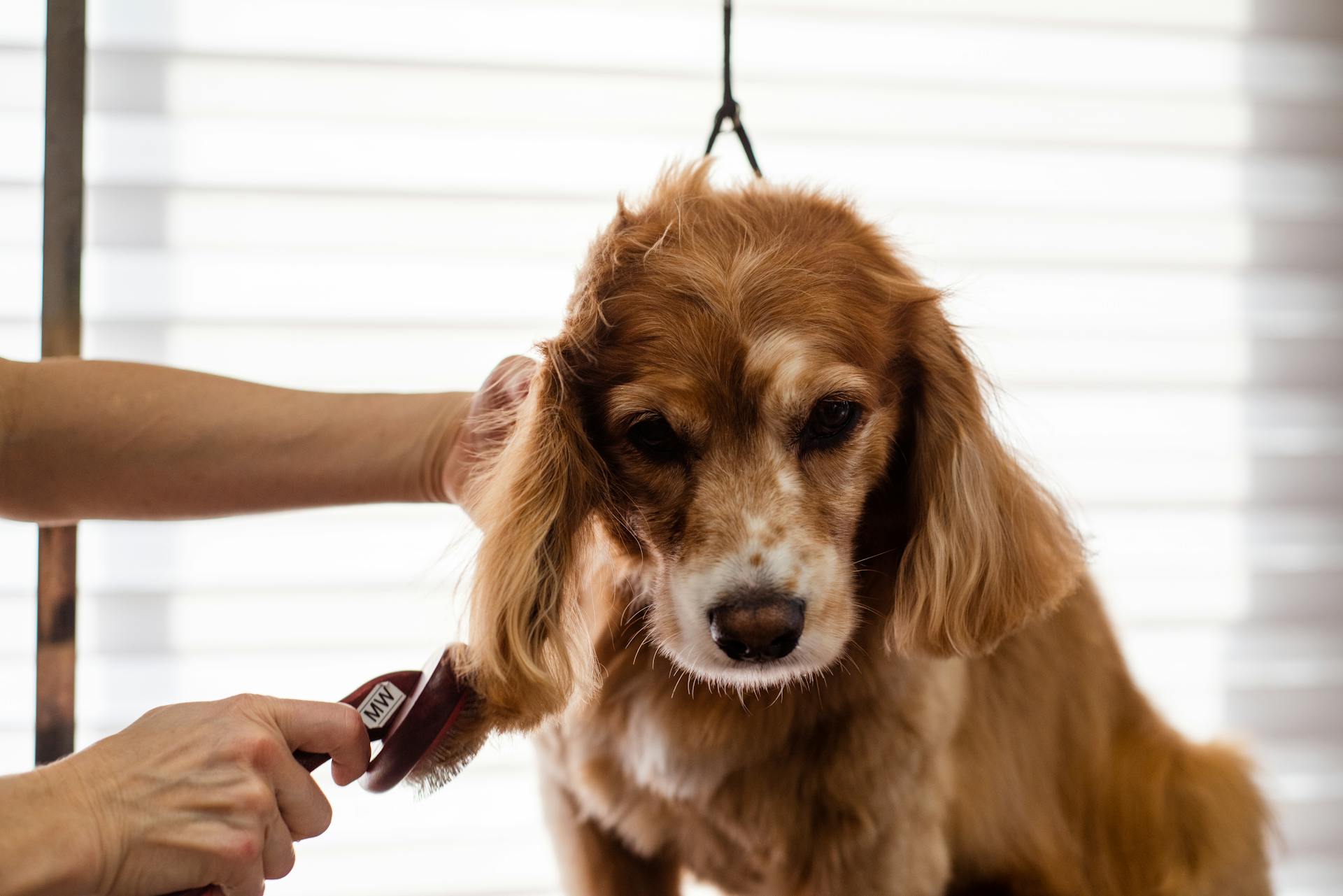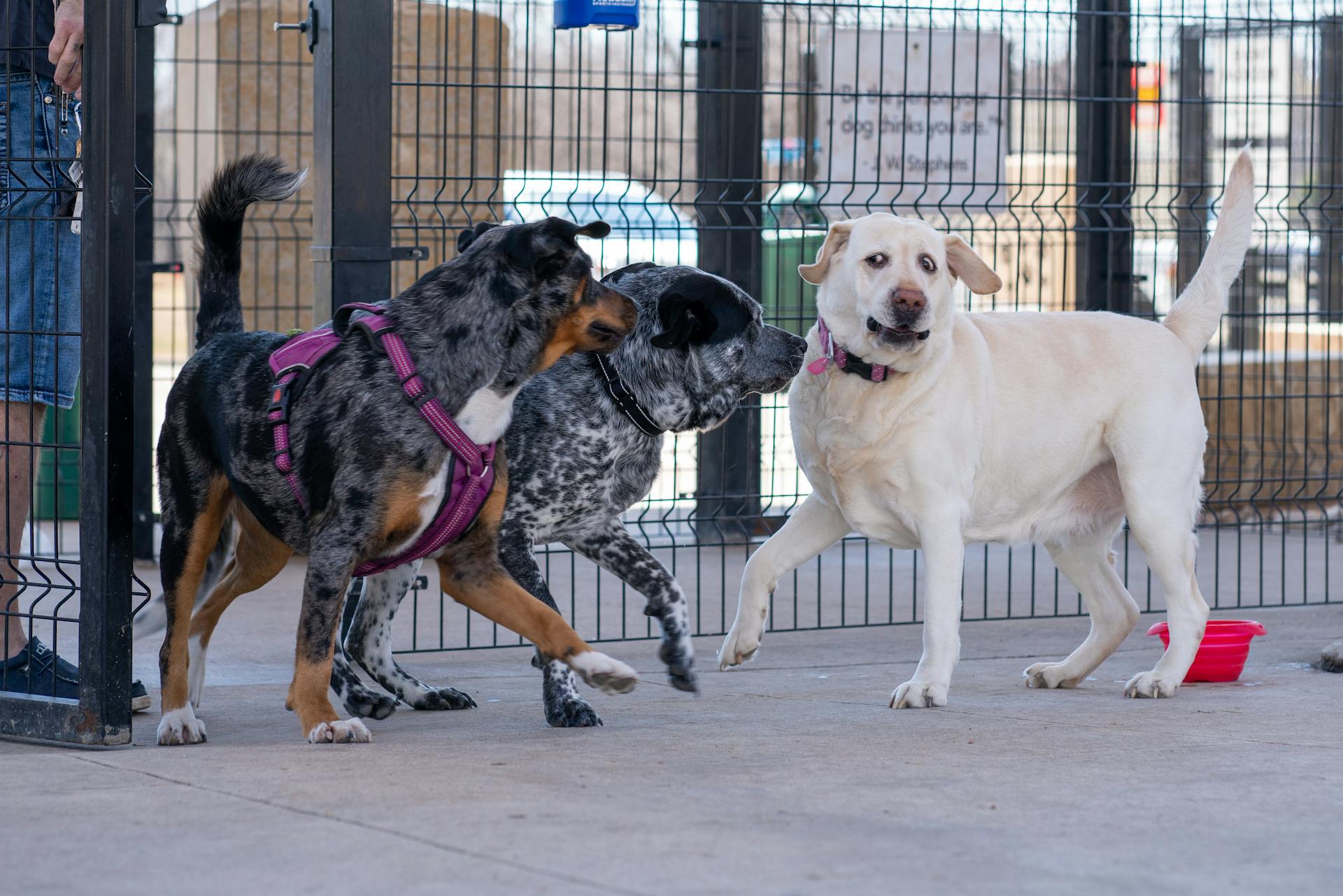
If you're considering bringing a Newfoundland Dog or Golden Retriever into your family, it's essential to understand the unique needs of these breeds.
Newfoundland Dogs are massive, with males weighing up to 150 pounds and standing as tall as 28 inches. They originated in the province of Newfoundland, Canada, as working dogs, helping fishermen and assisting with search and rescue missions.
Golden Retrievers, on the other hand, are friendly, energetic dogs that originated in Scotland as hunting companions. They're known for their luscious golden coats and friendly demeanor.
Both breeds require regular exercise to stay happy and healthy.
A unique perspective: Golden Breeds of Dogs
All-Around Friendliness
Newfoundland dogs are known for their affection towards children, which makes them an excellent choice for families with kids.
Their high intelligence and strong desire to please their family also make them highly trainable and eager to learn.
Early socialization is crucial for Newfoundlands, and exposing them to various people, environments, sounds, and experiences from a young age helps shape them into well-rounded and confident dogs.
Enrolling a Newfoundland puppy in a puppy kindergarten class is an excellent way to kickstart their socialization journey.
They thrive when in the company of their loved ones and should not be left alone for extended periods or isolated in the backyard or kennel.
Regularly inviting visitors, taking them to bustling parks, dog-friendly stores, and leisurely strolls to meet neighbors will also aid in honing their social skills.
Their sweet and lovable disposition makes them a big, cuddly Teddy Bear, and they love being around people.
Exercise and Care
Newfoundland dogs are relatively calm, but they still need regular physical activity, especially swimming, which they excel at.
Their rapid growth between four and seven months makes them susceptible to bone disorders, so it's essential to protect their growing joints.
Avoid having a Newfoundland puppy run and play on hard surfaces like pavement until they're at least two years old, and their joints are fully developed.
Swimming is an excellent exercise option for Newfoundland puppies, as it helps build their muscles without risking joint injuries.
Normal play on grass is generally safe, and participating in puppy agility with one-inch jumps is also okay.
Training should commence as soon as you bring your Newfoundland puppy home, and they're generally eager to please, making training relatively easy.
Leash training is particularly important for Newfoundlands, especially considering that they'll reach over 100 pounds when fully grown.
Enrolling them in puppy kindergarten and obedience classes is highly recommended to provide structured training and socialization opportunities.
Size and Appearance
Newfoundland dogs are truly massive, with males reaching a height of 28 inches at the shoulder.
Their strong, muscular bodies are covered in a dense, water-resistant double coat.
Females are slightly smaller, but still a impressive sight.
Size
Newfoundland dogs are truly massive in size. Males can reach a height of 28 inches at the shoulder.
Their strong, muscular bodies are covered in a dense, water-resistant double coat. This coat comes in various colors, including black, brown, gray, and Landseer (black and white).
Females are slightly smaller than males. They still pack a punch, weighing up to 150 pounds.
You might enjoy: Black Lab Mix with Golden Retriever
Coat Color & Grooming

Newfoundlands have a beautiful, water-resistant double coat that requires regular maintenance. The breed comes in various coat colors, including solid black, brown, gray, and Landseer (white with black markings).
Shedding is moderate, with the heaviest shedding occurring in the spring and fall seasons. This means you can expect to see a lot of hair around the house during these times.
Proper coat maintenance involves brushing your Newfoundland two to three times a week. This will help prevent matting and tangling of their fur.
Bathing should be done every one to two months, and many owners prefer to take their Newfoundlands to a professional groomer for this task. Regular brushing is still necessary, even if you're having a professional groomer do the bathing.
Newfoundlands tend to get dirty easily, so be prepared for muddy paws, entangled leaves or burrs, and feces on the hindquarters.
On a similar theme: Golden Retriever Blowing Coat
Health and Traits
Newfoundlands are prone to a range of health issues, including Addison's Disease, which can cause vomiting, poor appetite, and lethargy.
Cataracts are also common in Newfoundlands, and can cause cloudy spots on the eye lens. Regular veterinary check-ups can help catch this condition early.
Epilepsy is another inherited condition that can affect Newfoundlands, causing mild to severe seizures. Proper diagnosis and treatment are essential to manage this condition.
Hip Dysplasia and Elbow Dysplasia are also heritable conditions that can cause joint pain and lameness in Newfoundlands. Regular screening can help identify affected dogs.
Cystinuria, a kidney disorder, can cause the formation of stones in the urinary tract, which can be managed with medication. Genetic testing is also available for this condition.
Gastric Torsion, also known as Bloat, is a life-threatening condition that affects large breeds like Newfoundlands, requiring immediate veterinary attention.
Feeding
Feeding your Newfoundland is crucial for its overall health and well-being. Provide 4 to 5 cups of high-quality dry food per day, divided into two meals.
It's essential to choose a high-quality dog food that meets your Newfoundland's nutritional needs. Look for a food that contains 22 to 24 percent protein and 12 to 15 percent fat.
Portion control is vital to prevent overeating and maintain a healthy weight. Measure the food and feed your Newfoundland twice a day rather than leaving it out continuously.
Each dog's food requirements vary based on factors like size, age, metabolism, and activity level. Adjust your feeding schedule accordingly to ensure your Newfoundland stays healthy.
Better nutrition can actually reduce the quantity of food required, so choose a high-quality dog food to support your Newfoundland's growth and development. For more detailed feeding guidelines, consult your veterinarian.
Health
Newfoundlands can develop Addison's Disease, a serious condition caused by the adrenal gland's failure to produce sufficient hormones, leading to symptoms like vomiting, poor appetite, and lethargy.
Regular eye exams are crucial for Newfoundlands, as they can develop cataracts, cloudy spots on the eye lens, similar to humans.
Cherry Eye, a swelling of the third eyelid gland, can appear as a red mass in the inner corner of the eye, often requiring surgical intervention.

Newfoundlands can inherit epilepsy, resulting in mild to severe seizures that require proper diagnosis and treatment.
Hip Dysplasia, a heritable condition, occurs when the thighbone doesn't fit properly into the hip joint, and regular screening is recommended.
Elbow Dysplasia, a hereditary condition, causes joint laxity and lameness in large breeds, and treatment options include surgery and pain management.
Newfoundlands are prone to Cystinuria, an inherited disorder that impairs the reabsorption of cystine in the kidneys, leading to stone formation in the urinary tract.
Cancer is a significant concern for Newfoundlands, with various forms affecting the breed, and early detection is key to effective treatment.
Gastric Torsion, or Bloat, is a life-threatening condition affecting large, deep-chested breeds, including Newfoundlands, requiring immediate veterinary attention.
Additional reading: Dog Breeds Shar Pei Mixes
Traits and Characteristics
Living a healthy lifestyle is not just about physical health, but also about mental and emotional well-being.
Genetics play a significant role in determining our traits and characteristics, with some people naturally more inclined towards certain habits or behaviors.

Research has shown that people with a family history of obesity are more likely to develop the condition themselves.
Our diet and exercise habits can also have a significant impact on our traits and characteristics, with regular physical activity improving cognitive function and reducing the risk of chronic diseases.
A study found that people who engage in regular exercise have better mental health and a lower risk of depression.
Our environment and upbringing can also shape our traits and characteristics, with people from supportive and nurturing families more likely to develop positive traits such as empathy and self-confidence.
Finding and Choosing
Finding a Newfoundland dog and Golden Retriever mix can be a bit tricky, but the internet is a great resource to track them down. You can use pet-oriented search engines like Petfinder to find leads on these designer dogs.
Reputable breeders are essential when searching for a puppy, so make sure to research and select a trustworthy one. Meeting the puppy's parents ahead of time is also a good idea to get an idea of what to expect.
You can also check local shelters and rescues, especially if you're open to adopting an older dog. Keep in mind that these dogs may have a mix of breeds in their gene pool, but that's not necessarily a bad thing.
Where to Find

You can start your search for a Golden Newfie on the internet, specifically on pet-oriented search engines like Petfinder, which can give you leads on these designer dogs.
The internet is a great resource, but you can also ask other Golden Newfie owners if they know of any reputable breeders.
Be sure to ask about the breeder's reputation and meet the parents of your future puppy to get an idea of what your new furry friend will be like.
If you're not opposed to adopting an older Golden Newfie, you can also check local shelters and rescues.
Adopting an older Golden Newfie can be a wonderful option, and you may even find one with a mix of other dog breeds in its gene pool.
Best Families
If you're looking for a family that's a great match for a Golden Newfie, consider one that's always home. These people-oriented dogs thrive in households where someone is always available to play and hang out.
A family with a busy schedule may not be the best fit, as Golden Newfies can suffer from separation anxiety. They need daily attention and interaction to stay happy.
If you're a family that's willing to work on training, a Golden Newfie might be a great addition. These dogs are highly sensitive and respond well to positive and patient training.
A family with young children may be a great match, as Golden Newfies love spending time with people of all ages. They're also great with friends and family members.
To give you a better idea, here are some key characteristics of families that are well-suited for a Golden Newfie:
In general, Golden Newfies are a great fit for families that are looking for a loyal and loving companion.
Similar Breeds and Parent Breeds
The Golden Newfie's parent breeds can give you a good idea of their personality. The Golden Retriever and Newfoundland are both known for being gentle and intelligent.
The Golden Retriever is a friendly and loyal breed that's great with kids. They're also highly trainable, which makes them a popular choice as family pets.
The Newfoundland, on the other hand, is a large and gentle breed that's naturally wary of strangers. Early socialization is key to helping them feel comfortable around new people.
Here are some similar breeds and breed mixes to consider if you're unsure about the Golden Newfie:
- Bernefie: This Bernese Mountain dog and Newfoundland mix is gentle, intelligent, and good with kids.
- Golden Saint: This Saint Bernard and golden retriever mix is a gentle, loving family companion.
- Newfoundland Labrador Mix: This Newfoundland and Labrador mix is incredibly intelligent and loyal.
- Golden Pyrenees: This golden retriever and great Pyrenees mix is a sweet, protective pooch.
- Bernese Mountain Dog: The Bernese mountain dog is good-natured, kind, and endlessly devoted to their family members.
- Leonberger: These highly intelligent gentle giants love playing and spending time with their family members.
- Saint Bernard: Saint Bernards are playful pups that are known for their big size and even bigger hearts.
Similar Breeds and Mixes
If you're considering a Golden Newfie but want to explore other options, there are several breeds and mixes that might be a great fit for your family.
The Bernefie, a mix of Bernese Mountain dog and Newfoundland, is known for being gentle and intelligent. Early socialization is crucial to help them feel comfortable around strangers.
These big buddies bond closely with their family members, making them a great choice for families with kids. Their gentle nature and intelligence make them a joy to be around.
Curious to learn more? Check out: Golden Retriever Family Dog
The Golden Saint, a mix of Saint Bernard and golden retriever, is a playful and loving family companion. Their happy-go-lucky personalities are infectious and will keep you on your toes.
These fluffy friends are perfect for families who want a dog that's always up for an adventure. With proper training, they can become a well-behaved member of the family.
If you're looking for a dog that's incredibly intelligent and loyal, the Newfoundland Labrador Mix might be the way to go. They love following their family members around the house.
Their loyalty and intelligence make them a great choice for families who want a dog that's always by their side. With proper care and attention, they can thrive in any environment.
For a sweet and protective pooch, consider the Golden Pyrenees, a mix of golden retriever and great Pyrenees. They have a strong instinct to protect their family, but they're also friendly and loving.
These friendly floofs are perfect for families who want a dog that's both loyal and affectionate. With proper training, they can become a valuable member of the family.
Explore further: Golden Retriever Great Pyrenees Mix
The Bernese Mountain Dog is a great-natured and kind breed that's perfect for families with kids. They're endlessly devoted to their family members and make great companions.
Their hard-working nature and gentle disposition make them a great choice for families who want a dog that's easy to care for. With proper attention and care, they can thrive in any environment.
The Leonberger is a highly intelligent breed that loves playing and spending time with their family members. They're eager to please and fairly easy to train.
These gentle giants are perfect for families who want a dog that's both intelligent and loving. With proper care and attention, they can become a well-behaved member of the family.
Here are some breeds and mixes that are similar to the Golden Newfie:
- Bernefie: A mix of Bernese Mountain dog and Newfoundland
- Golden Saint: A mix of Saint Bernard and golden retriever
- Newfoundland Labrador Mix: A mix of Newfoundland and Labrador
- Golden Pyrenees: A mix of golden retriever and great Pyrenees
- Bernese Mountain Dog: A purebred breed
- Leonberger: A purebred breed
- Saint Bernard: A purebred breed
Understanding Newfie Parent Breeds
The Golden Newfie's personality is influenced by its parent breeds, the Golden Retriever and Newfoundland.
Golden Retrievers are loyal, devoted, gentle, and athletic without being too busy. Most Golden Newfies love the water, and both Golden Retrievers and Newfoundlands are true water dogs with webbed feet and dense, water-resistant coats.
A unique perspective: Golden Retriever Water Dog

Newfoundlands are known for being patient, intelligent, and good with kids. These big buddies bond closely with their family members and may be naturally wary of strangers.
The combination of these two breeds makes the Golden Newfie a unique and loving family companion.
Here are some key characteristics of the Golden Retriever and Newfoundland breeds:
Understanding your pup's parent breeds can give you key insights into your mutt's personality.
Frequently Asked Questions
What is the personality of a golden Newfie?
Golden Newfies are known for their calm and patient nature, making them a great fit for families with children. They are loyal and protective of their loved ones, but generally gentle and non-aggressive.
Featured Images: pexels.com

